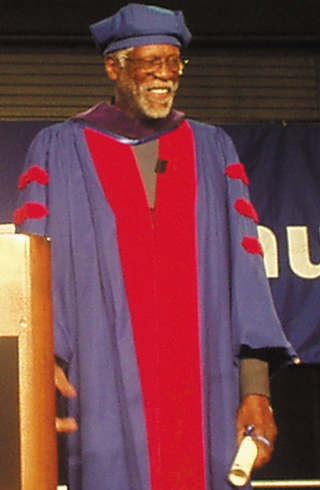Russell Is Now A Beacon

Bill Russell, seen her receiving
June 4, 2002
Bill Russell’s list of accomplishments is both long and illustrious. Although he is most noted for his extraordinary basketball ability, it is because of his deeds off the court that he was a recipient of an honorary degree at UMass Boston’s 34th commencement on Saturday June 1.
In a robe that was too short and black basketball sneakers, Russell, an ex-Boston Celtic player and coach, towered over his fellow honorary degree recipients. The crowd of 2500 students gave the Hall of Famer a thundering round of applause when approached the podium to receive his honorary degree as a Doctor of Laws from UMass President William Bulger
William Felton Russell was born on February 12 1934 in Monroe, Louisiana in the throes of the Great Depression. His family moved to Oakland, California during World War II, where he first began to play basketball.
His high school career was undistinguished. In fact, Russell did not even start for the team until his senior year. It was one of the reason’s the six foot nine inch teenager had to try out for a college team, working out for coach Phil Woolpert of San Francisco University to receive a scholarship.
Outstanding collegiate play and back-to-back NCAA championships in 1955 and 1956 made one Red Auerbach of the Boston Celtics take notice of the young center. A trade later and Russell became a Boston Celtic, the only team he ever suited up for as a professional basketball player. But before Russell made his debut in Celtic green, he donned red, white, and blue for the US basketball squad in the 1956 Olympics in which he helped the team bring home the gold.
The thirteen years that Russell played for the Celtics was an amazing period of team accomplishment that may never be duplicated. His teams won 11 championships, including eight consecutive from 1959 to 1966. A five time Most Valuable Player, Russell dominated all phases of the games, from outstanding low post moves to the most effective shot blocking the NBA has ever seen.
Despite his impressive athletic ability and leadership skills, Russell did not endear himself to many fans in Boston. His career took place during the time of civil unrest in the United States, and Russell never backed away from letting his thoughts be known. Racial discrimination had plagued him throughout his life, and his candid remarks on social issues often made Celtic fans bristle.
The Celtic great did more than set records and receive awards during his astonishing career; he was a barrier breaker. In 1966, Russell became the first African American to coach a professional sports team, doing so as a player-coach for two years. He was the first black basketball player to be elected to the NBA Hall of Fame in 1975. (Russell did not attend the induction ceremony due to his frustration with the lack of black basketball players in the Hall of Fame.)
Russell retired in 1969 as a player and coach, although he resurfaced on the bench of the Seattle Supersonics for a five-year stretch with moderate success. He worked as TV sports commentator briefly, but he returned to coaching once more in Sacramento where his record led to a quick exit from the bench to the front office.
Basketball feats aside, it is Russell’s continued interaction with school groups and inner city youths distinguish him from other star athletes. He has written a book Russell Rules that effectively depicts the reward of successful teamwork and making the most of one’s ability. It is his concern for the good of all that sets Russell apart from other athletes and other dignitaries.










































































